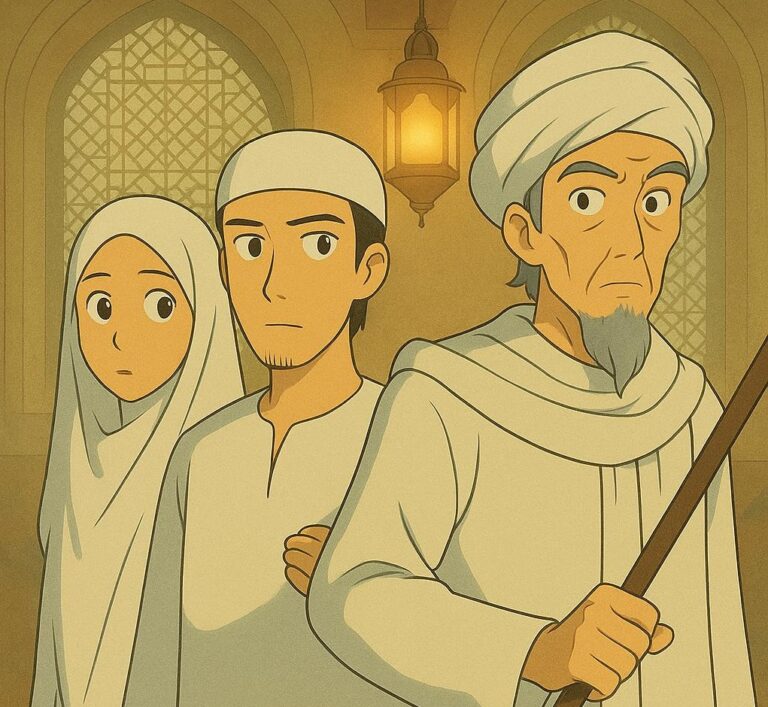Articles
Paragon of Brilliance: Imam As-Syafie
- BY Ustaz Huzhaifah Kamal
- ON
- scholars, knowledge, spirituality, faith

A glimpse into Imam As-Syafie
In the aftermath of the Prophet s.a.w’s passing, the Muslim world grappled to find its balance amidst a myriad of challenges. From internal divisions to external threats and evolving societal norms, the early Muslim society faced a complex tapestry of issues. Amidst this turbulence emerged a paragon of brilliance. He is Muhammad ibn Idris al-Shafiee Al-Muttalibi Al-Qurashi. His teachings and exemplary character, coupled with his tremendous intellectual capacity and exposure, provided a timeless beacon of guidance for Muslims in the world.
The Prophet s.a.w mentioned,
الْعُلَمَاءُ خُلَفَاءُ الأَنْبِيَاءِ إِنَّ الأَنْبِيَاءَ لَمْ يُوَرِّثُوا دِينَارًا، ولَا دِرْهَمًا إِنَّمَا وَرَّثُوا الْعِلْمَ
The scholars are the successors to the prophets, for which the prophets did not leave behind wealth, they left behind knowledge.
This prophetic saying is most aptly applied to Imam Shafiee whose embodiment of resilience and astounding intellectual capacity, deeply rooted in the Quran and the traditions of pious predecessors, paved the way for later Muslims to follow the guidance of the prophets in an ever-evolving world. His impact coined him the ‘Mujaddid’ (reformer) of his era, in line with a prophecy by our beloved prophet which discusses the periodic emergence of such reformers.
The Prophet s.a.w prophesised,
يبعث الله على رأس كل مائة عام من يجدد لهذه الأمة أمر دينها
Allah will raise for this community at the end of every 100 years the one who will reform its religion for it.
Countless scholars, including his student Imam Ahmad ibn Hanbal, have mentioned that a man most befitting of this description would have been Imam Shafiee, whose presence remarkably came a century after another towering figure in Islamic history, Khalifah Umar ibn Abdul Aziz.
أَنَّهُ كَانَ فِي الْمِائَةِ الأُولَى عُمَرُ بْنُ عَبْدِ الْعَزِيزِ، وَفِي الثَّانِيَةِ الشَّافِعِيُّ
Verily it is Umar ibn Abdul Aziz in the first hundred, and Al-Shafiee in the second hundred.
Al-Shafiee – A renowned student of knowledge
Imam Shafiee was renowned within the Muslim community of his era for his extraordinary intellect. His intellectual capabilities were unparalleled, leading scholars of his time to laud him with high praise. The Egyptian scholar, Yunus Ibn Abdul A’la, regarded Imam Shafiee as the most brilliant mind of their age, stating,
ما رأيت أحداً أعقل من الشافعي، لو جمعت أمة فجعلت في عقل الشافعي، لوسعهم عقله
I have not seen anyone more intellectual than al-Shafiee. If you gathered a whole nation and put them into the intellect of al-Shafiee, his mind would accommodate them all.
Imam Shafiee was born in Gaza in 150 AH and faced an early life marred by hardships. Yet, his story teaches us that a challenging beginning does not preclude a future filled with hope and achievement. Even though he shared the blessed lineage of Prophet Muhammad s.a.w, he lived a life of poverty and hardship. He lost his father at a young age and was raised by his mother by herself. Despite all this, his life stands as a powerful counter-narrative to the social perception that society often debates, demonstrating that resilience transcends any obstacles life can offer.
كم يرفع العلم أشخاصًا الى رتبِ
ويخفض الجهل أشخاصًا بلا أدبِ
ليس اليتيم يتيم المال والأبِ
إن اليتيم يتيم العلم والأدبِ
How knowledge elevates people to ranks,
And ignorance lowers those devoid of manners.
The orphan is not the one lacking wealth or a father,
The true orphan is the one devoid of knowledge and manners.
This saying of Imam Shafiee’s renowned words encapsulates his ethos. The hardship that surrounded him never deterred his thirst for knowledge. This love for knowledge could be attributed to his mother, who, in the pursuit of Imam Shafiee’s intellectual development, relocated to Makkah when he was just two, where he began learning the religion under the supervision of the Mufti of Makkah then, Muslim ibn Khalid az-Zanji. It was in Makkah where he began committing the Quran, and countless prophetic traditions to memory. He was ten when he completed memorizing the Muwatta’ (Imam Malik’s compilation of the Prophetic traditions) after which he went under the tutelage of Imam Malik, who soon recognized his keen intellect and potential. By 15, he was already certified by his teacher to give religious verdicts and opinions.
اِصبِر عَلى مُرِّ الجَفا مِن مُعَلِّمٍ
فَإِنَّ رُسوبَ العِلمِ في نَفَراتِهِ
وَمَن لَم يَذُق مُرَّ التَعَلُّمِ ساعَةً
تَذَرَّعَ ذُلَّ الجَهلِ طولَ حَياتِهِ
Be patient with the bitterness of being taught by a teacher,
For the essence of knowledge resides in his strictness.
Whoever doesn’t taste the bitterness of learning for an hour,
Will suffer the humility of ignorance all his life.
This quote by Imam As-Shafiee is not a platitude but the cornerstone of his existence. It vividly captures his view that the quest for knowledge, though fraught with challenges and requiring boundless patience, ultimately elevates one’s purpose and essence.
The path of knowledge – A pursuit of the pious
One of the most profound episodes in Imam Shafiee’s life occurred when he found himself struggling with poor memory retention, a crucial setback for anyone but especially disheartening for a scholar of his stature. Feeling burdened by this issue, Imam Shafiee approached one of his teachers, Waki’ ibn Jarrah to seek guidance.
It was during this humble admission of his perceived limitation that Waki’ offered him advice that would forever shape his approach to learning and spirituality. Waki’ advised him to abandon sins, alluding to him that knowledge is a light from God, and God’s light is bereft for a sinner.
Inspired and deeply moved by his teacher’s wisdom, Imam Shafiee composed a famous couplet in Arabic:
شكوت إلى وكيع سوء حفظي … فأرشدني إلى ترك المعاصي
وأخبرني بأن العلم نور … ونور اللَّه لا يهدي لعاصي
I complained to Waki’ about my poor memory, and he guided me to abandon sins.
He said, ‘Knowledge is a light from the soul, and the light of God is not given to a sinner.
This exchange between teacher and student goes beyond the simple question of memory and learning; it delves into the ethical and spiritual realms, emphasizing that acquiring knowledge is not just a mental exercise but a holistic endeavor that involves the entire being—mind, body, and soul.
The Humble Scholar and Critical Thinker
Imam Shafiee wasn’t just a receiver of knowledge; he was a critical thinker who constantly interrogated what he learned. While he was critical of his opinions and his fatwas, he was conscious of his fallibility and was open to his propensity of making mistakes and warned students against following him should they find him to be in the wrong.
He unapologetically said,
إذَا صَحَّ الْحَدِيثُ خِلَافَ قَوْلِي فَاعْمَلُوا بِالْحَدِيثِ وَاتْرُكُوا قَوْلِي، أَوْ قَالَ فَهُوَ مَذْهَبِي
If something contrary to my view exists on the authority of the Messenger of Allah s.a.w, then leave my word and follow the Messenger s.a.w, for it is my teachings too.
This intellectual rigor became most evident when he revised his own legal doctrine. Imam Shafiee was well-known to have been impacted by the two prominent luminaries of his era- Imam Malik (while he was in Madinah) and the student of Abu Hanifah, Muhammad Ibn Hasan Al-Shaybani (while he went to Iraq). Being under both their tutelage, he merged the two methodologies and created a Mazhab of his own- known as al-Mazhab Al-Qadim lil Imam Al-Shafiee (The old Mazhab of Imam Al-Shafiee).
Towards the later part of his life, he moved to Egypt where he encountered alternative perspectives that enlightened his opinions and view of Islamic jurisprudence. With an open mind and humility that is rarely seen among scholars so established, he revised his entire legal methodology. This revision was not a sign of weakness or inconsistency, but rather a testament to his intellectual openness and dedication to the pursuit of truth.
His teachings incorporated a blend of strict textualism from the Quran and Hadith with rational reasoning (ijtihad), creating a balance between strict textual interpretation and human reason. He championed the use of intellectual rigor in deriving legal principles, asserting that while the Qur’an and Hadith are central, they are not exhaustive in addressing every conceivable situation. In such instances, Ijma’ (consensus among scholars) and qiyas (reasoned analogy) fill in the gaps, ensuring that Islamic law remains applicable across different eras and cultures.
This laid the groundwork for one of the four Sunni schools of Islamic Jurisprudence, known as the Shafiee school, embodied in his magnum opus called “Al-Umm”, which continues to be a reference by millions of Muslims today. Imam Shafiee also composed the first book on the fundamentals of Islamic Jurisprudence called “Al-Risalah”, which organized his methods of deriving rulings and later on became the basis for the development of Usul Fiqh until today.
The poet, the linguist
What elevates Imam Shafiee beyond a historical figure into a timeless symbol is his unwavering ethical integrity and spiritual depth. However, it became more pronounced when Imam Shafiee himself was a man of deep understanding in Arabic Language, hiding his principles behind prose and poems of high linguistic value. His writings and values exhibit an inner sanctity and moral uprightness that many yearn for today.
إِذا رُمتَ أَن تَحيا سَليماً مِنَ الرَدى
وَدينُكَ مَوفورٌ وَعِرضُكَ صَيِّنُ
فَلا يَنطِقَن مِنكَ اللِسانُ بِسَوأَةٍ
فَكُلُّكَ سَوءاتٌ وَلِلناسِ أَلسُنُ
وَعَيناكَ إِن أَبدَت إِلَيكَ مَعائِباً
فَدَعها وَقُل يا عَينُ لِلناسِ أَعيُنُ
وَعاشِر بِمَعروفٍ وَسامِح مَنِ اِعتَدى
وَدافِع وَلَكِن بِالَّتي هِيَ أَحسَنُ
If you aim to live unharmed by harm,
With your religion intact and your honor unscarred,
Guard your tongue and don’t mention the faults of others,
For you have many faults and people have tongues to speak.
If your eyes show you the faults of others,
Ignore them and say, “O eyes, others have eyes too.”
Treat others kindly, forgive those who harm you,
And respond, but always with what is better.
Imam Shafiee refused governmental appointments, choosing instead the path of intellectual and spiritual freedom, which only added to his credibility and ethical standing. His verses of poetry echo the inner landscapes of his spirituality, revealing a man who was as deeply introspective as he was scholarly.
Imam Shafiee’s methodology and sayings continue to resonate profoundly. In a society often polarized between traditionalism and modernity, his balanced approach offers a third way, suggesting that reason and tradition need not be in conflict but can, in fact, enrich each other. His legacy serves as a timeless reminder that the quest for understanding and wisdom is a journey that employs both the texts we revere and the intellect we are endowed with, culminating in a balanced, just, and humane interpretation of law and life.
Disclaimer
Support Our Dakwah










